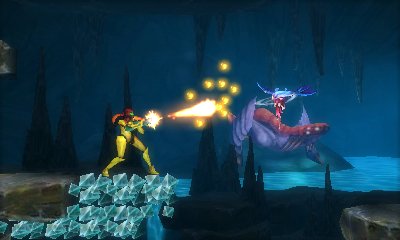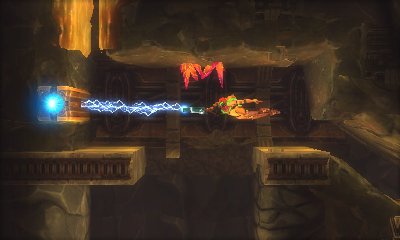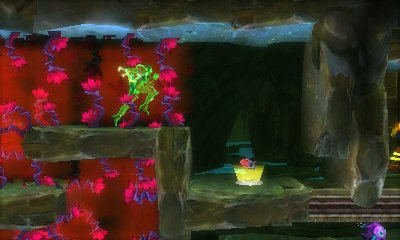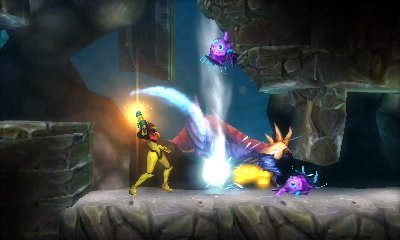If there's one pastime that's always scared the bejesus out of us, it's potholing. Say what you will about safety records and all that, but being a fairly burly-proportioned person, there's no way you'd see us squeezing through a cave that's barely any wider than an average house cat. Not unless our life depended on it, and we'd greased ourselves up like Groundskeeper Willie beforehand anyway. However, if you're an intergalactic bounty hunter, it seems you can't afford to be too picky about the small spaces you have to enter - although the ability to curl yourself up into a tiny ball does help.
Metroid: Samus Returns is a 2D adventure that often falls under the rather unhelpful category of a Metroidvania (that is, it's a game a bit like itself). Essentially an adventure game in its truest form, Samus Returns sees you, playing as Samus Aran, having to return to the planet SR388, in order to eradicate a population of the deadly, parasitic Metroid aliens that have popped up there. Landing your ship to the traditional Metroid fanfare (if you're a longtime fan, that's the goosebumps moment), you'll hop out, arm up, and get ready to venture into the great unknown. Literally - because when you first get going, you'll have a completely blank map.

Although you'd rather a blank map than an angry flying beastie
In a game like Metroid, your map is your best friend, as the inner catacombs of the planet SR388 are a twisting, winding mess of interconnecting corridors, caves, narrow passages and secret tunnels. As you explore, the game will automatically draw your map in for you, along with noting any routes you haven't yet taken, so you can come back later (and brilliantly, you can even make manual notes on the map yourself, placing markers when you find something interesting you might want to come back to). And while venturing off the beaten track can be almost pointless in some games, when it comes to games like Metroid, it's actually essential, as if you just head blindly from A to B, you'll end up having a much, much harder game.
Instead, playing Metroid is all about hunting down the secrets - exploring as much as you can, trying to squeeze into all of those holes, and hunting down every last power up going. With a world that's absolutely been designed to be explored, you'll find yourself rolling around, dropping bombs everywhere, and shooting every last wall, as you hunt out that one bit of terrain that's destructible, and will lead you into the next cavern. Hidden away as optional pick ups, you'll regularly find health boosts that increase your total health; rocket packs that let you carry more of the game's fail-safe heavy weapon; and all important energy/health restore points that'll make your adventure that much easier

Super Samus to the rescue!
The only problem you'll have is figuring out how to get there. While it may be all about the exploration, at times Metroid can feel more like a puzzle game, as you'll be able to see the faded sections of your map that you haven't yet explored, and will have to use your noggin to figure out how to actually reach them. Whether it's a destructible section of wall you'll need to find, blast and roll through; a passing enemy you can zap with your ice gun to freeze, and then use as a platform to reach the higher ground; or a door you can't yet open, until you've unlocked a later power, you'll regularly have to put your grey matter to use, and experiment in order to see what can and can't be done.
One of the most useful abilities in Metroid is the ability to roll up into a ball. While you'll initially only be able to curl up and roll down narrows passages, as you explore, you'll unlock the ability to jump, drop bombs, and most importantly, stick to the wall like a spider. Essentially allowing you to attach yourself to a surface, you can use the "spider ball" mode to roll up vertical walls, across ceilings, and reach all sorts of previously inaccessible areas, making this one of the most useful power ups going.

These red flowers hurt you - but the unlockable shield seen here will protect you, letting you grab that missile power up
While it may sound like it's a completely free form, open world game, there's actually more of a structure to Metroid: Samus Returns than you may think. While your main and only objective is still to track down the Metroid that are hiding deep within the caverns, and take them out, you rarely feel truly lost, or like you're not sure what or where to go next, with the game always gently nudging you in the right direction. Whether it's an obviously unexplored section of your map, or a well timed pick up that lets you unlock a new type of door, the progression here feels natural, and encourages you to keep playing - which is more than can be said for the enemies.
In a bit of an unusual move - yet one that's fast becoming the norm - Metroid: Samus Returns is a Nintendo game without an adjustable difficulty level. That wouldn't usually be too much of an issue - but the problem is, the game's pretty flipping solid. The caverns here are much more packed with life than we remember on the earlier games, with enemies having a nasty habit of dashing at you - a move that's very tricky to dodge, and almost always guarantees you'll take damage. In fact, the only fail safe way to avoid taking damage is to execute a well timed melee attack (one of Samus' new moves), which bashes the enemy back, and gives you a second to blast it. The only issue is, it can be tricky to get the timing right, the enemies do a lot of damage if they do hit you, and they can take a beating too. It's not unusual to have to shoot an enemy half a dozen times or more before they eventually fade away - and that's about the same amount of hits as you can take too.

That'll show him
Nowhere is the surprisingly punishing difficulty more of an issue than when taking on the Metroids themselves. Attacking mostly with dash attacks, you'll be hard pushed to keep dodging these parasitic brain-things, yet alone get any shots in. Just to make things harder, your bog standard weapon won't actually scratch the Metroids - instead, you'll need to rely on one of the other beams (if you've unlocked them), or your limited stock of rockets. Neither do a phenomenally good job, though, with the Metroid taking off huge chunks of your health should it even clip you, while it seemingly shrugs off 99% of your shots. And while there's at least a checkpoint system before each Metroid encounter, so you won't lose too much progress if it takes you several attempts, these are really rock solid enounters - as are the rest of the enemies in the game.
It's probably worth noting, too, that if this is your first time at the Metroid rodeo, you're likely to have a bit of a trickier time, as the game makes no attempt at all to introduce you to the Metroid basics. From how to shoot, to destructible blocks, and even how to open certain doors, there's next to nothing in the way of an explanation of the basics of the game. Almost the very first obstacle you'll come across is a wall with only a small gap in it. While you could crouch into a ball to roll under, you haven't unlocked that ability yet - so what do you do? Well, with the game not having told you anything, what you'll likely do is go all the way back where you've come, assuming you've gone the wrong way. What you actually have to do is blast it - but it took us quite a while to realise it. While you will unlock a power up later that lets you press A to "scan" the surrounding area, and highlights any destructible blocks, it'd be nice to have some sort of guidance to ease you into the game and its systems. Similarly, there's nothing to tell you that doors that have a red shield over can be blown up with rockets - something you'll know if you've played a Metroid game before, but something the game should really make more effort to introduce new players to.
In all, though, while it may be trickier for beginners to get the hang of, Metroid: Samus Returns is still an enjoyable, and nostalgic romp with a few new tricks up its sleeve. Let down by its punishing difficulty (and both flipping enemies and blocks that respawn - there's nothing like trying to blow your way through a complex series of corridors, only for the block you blew up to magically reappear just as you try and slot through), there's still a lot to like here. Though it may be a bit on the tricky side, Metroid is proof there's still life in the 3DS yet, and is well worth picking up if you're after something to play on the now aging console.
Format Reviewed: Nintendo 3DS


















